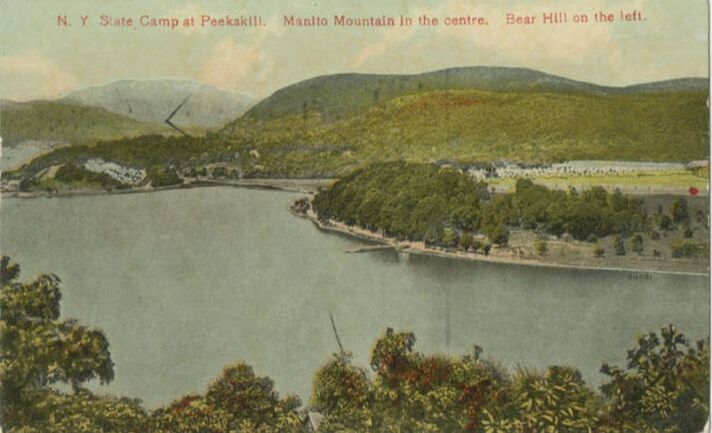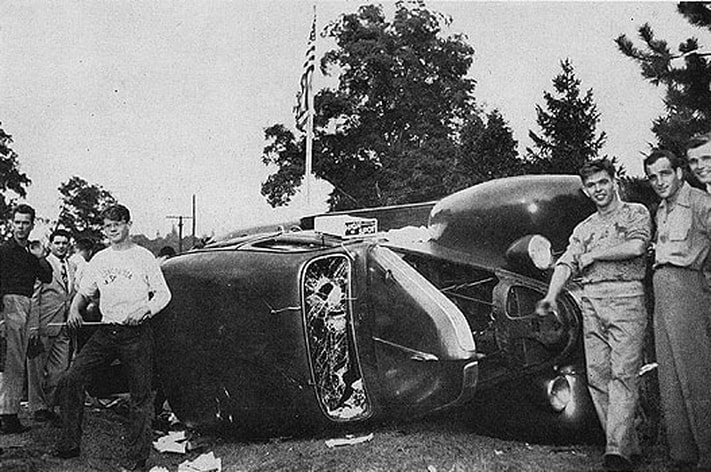 New York State Camp at Peekskill. Manito Mountain is in the center and Bear Hill is on the left. Looking down a hill over the Hudson River. Bear Mountain (formerly called Bear Hill) is one of the best-known peaks of New York's Hudson Highlands. Located mostly in Orange County's Town of Highlands, it lends its name to a nearby bridge and the state park that contains it. Courtesy New City Library. Peekskill is a city on the east shore of the Hudson River in Westchester County. In the early 17th century Dutch colonist Jan Peeck came to this area and met with the Lenape people near the confluence of the Annville and Peekskill Hollow Creeks. Jan Peeck lent his name to the creek which became known as "Peeck's Kill" (or the creek of Peeck). The town takes its name from the creek, even though the creek which flows down to the Hudson River is now known as the Annsville Creek. The Annsville Creek gave the town of Peekskill a important protected harbor. During the American Revolution, Peekskill hosted Fort Independence, which served as the headquarters for the Continental Army in 1776. As with many Hudson River port towns, Peekskill grew in the 19th century as industrialization gave rise to iron foundries and factories, including the Peekskill Chemical Works, which eventually became the company that would found Crayola Crayons. Peekskill is probably most famous, however, for the Peekskill Riots, which technically took place just north of Peekskill. In 1949 African American singer Paul Robeson was scheduled to perform at a benefit concert for the Civil Rights Congress. 1949 was a time of growing political unrest in the United States. Increasingly, people who argued against white supremacy and supported trade unions and civil rights were labeled "communists," including Pete Seeger. In particular, Robeson advocated for peace with the U.S.S.R., which angered many people. Robeson had performed at least three times before in Peekskill without incident, but earlier in 1949 he had been called before the House Committee on Un-American Activities to account for his travels to the U.S.S.R. He had appeared at the Soviet-sponsored Paris Peace Congress in April, 1949, where he gave a speech. The Associated Press ran a quote of Robeson's speech that turned out to be fabricated and inflamed existing tensions as it was published in newspapers around the country. Local Peekskill papers condemned the speech and Robeson's planned appearance in Peekskill. On the day of the planned concert on August 27, 1949, protesters attacked concert-goers and the violence left 18 people injured. The concert was postponed until September. On September 4, 1949, the concert went on as planned, but as the performers and concert-goers left, a gauntlet of protesters, including members of the VFW and American Legion, threw rocks at the departing vehicles. Pete and Toshi Seeger and their families shared a vehicle with Woody Guthrie, and Pete later used some of the rocks thrown through the windows to build the chimney of his house in Fishkill. In both instances of violence, the local police largely declined to intervene, despite injuries. The riots drew widespread condemnation among the general public, but the politics of defending people deemed communists were untenable at that time, and no government action was taken in response to the riots. Many government officials and the press denounced the violence as the fault of communist agitators. In the wake of the violence, Paul Robeson appearances in other cities were subsequently canceled, his name stricken from honorable records, and news footage of him destroyed. He was called before the House Un-American Activities Committee again in 1956, and he pled the Fifth Amendment, knowing that being a member of the Communist Party was legal in the United States. By then, anti-communist fervor in the United States that had been whipped up by Senator Joe McCarthy had begun to decline, and by the 1960s McCarthy was largely discredited. In 1999, on the 50th anniversary of the September 4 riots, the Paul Robeson Foundation held "A Remembrance and Reconciliation Ceremony" in Peekskill. Pete Seeger, Ossie Davis, Ruby Dee, Paul Robeson, Jr., and local activists. To those who hear the word "Peekskill" today, most often what comes to mind is not the forays of Jan Peeck or iron forges, but the dramatic violence in a time of burgeoning social and political unrest. If you enjoyed this history article, please consider making a donation to support the RiverWise project.
1 Comment
|
AuthorThis Captains' Log is kept by the captains and crew of Solaris and Apollonia and staff of the Hudson River Maritime Museum. ArchivesCategories
All
|

 RSS Feed
RSS Feed
